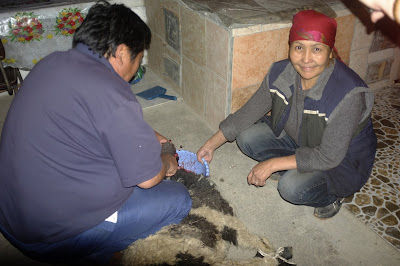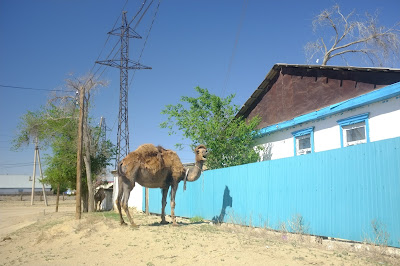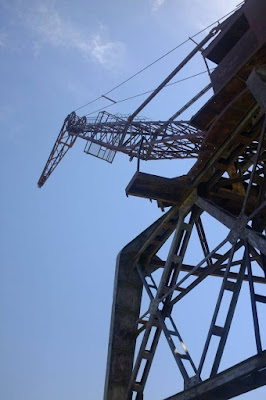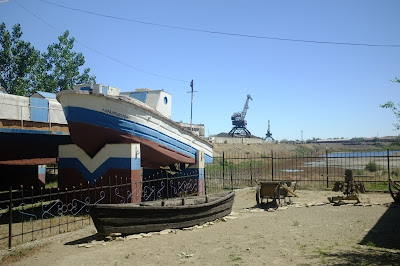The
Issyk-Kul lake is so vast that you almost can't see the opposite
shore. There is a lot of water in it. One could kind of expect a lot
of water in a lake, but after a month in the dry steppe, I stare at
it as if I saw a mountain of gold. We can bathe as much as we want in
it, and we have hectoliters of drinking water. Our plan is to visit
my (actually Janela's) family at the eastern end of the lake, which
will take us a couple of days to reach. Then, we want to see some
other Kyrgyz regions before our families fly in from Czechia to visit
us.
It's a pleasant journey, and not even corrupt cops we meet almost every day can spoil it.
It's a pleasant journey, and not even corrupt cops we meet almost every day can spoil it.
 |
| Valentina, Matteo and Horse at Issyk-Kul |
Czech secret agents
Our
next driver finds us suspicious. He agrees to take us on for free but
he just doesn't get why we are traveling. Why to Kyrgyzstan? Why with
little money? Why do we camp?
I
explain him over and over again in my bad Russian that we would like
to see countries we don't know and talk with people.
"So
you collect information."
"Kind of."
"How much does your government pay you?"
"What? ...nothing. We are just traveling because we like it."
The driver smiles with an unbelieving, self-assured smile of a person who knows the way things are.
"So you work for the Czech KGB, right?"
He stands his ground and there is no way I can convince him. He is rather friendly for somebody who thinks he has members of secret police on board, though. He even decides to leave the road for us, and drives us to a small salt pond. He and Vojta go swimming in it. Even though the pond is just several hundred meters from the shore of the fresh Issyk-Kul lake, it is so salty that you can just lie in the water without moving, and you won't sink.
"Kind of."
"How much does your government pay you?"
"What? ...nothing. We are just traveling because we like it."
The driver smiles with an unbelieving, self-assured smile of a person who knows the way things are.
"So you work for the Czech KGB, right?"
He stands his ground and there is no way I can convince him. He is rather friendly for somebody who thinks he has members of secret police on board, though. He even decides to leave the road for us, and drives us to a small salt pond. He and Vojta go swimming in it. Even though the pond is just several hundred meters from the shore of the fresh Issyk-Kul lake, it is so salty that you can just lie in the water without moving, and you won't sink.
 |
| The salt pond |
We
get a message from Valentina and Matteo, the bikers from the Caspian
ferry: they are around and will be staying in a hotel at Issyk-Kul
tonight.
We
arrive to their village by afternoon and find out that our friends,
like Alex yesterday, paid a huge fine to bandit cops for breaking a
non-existing rule.
Job description of a Kyrgyz interpreter
 |
| Hi horse. |
It
takes us two days, and that pre-sets our traveling speed for the week
to come.
The
day we finally leave our friends and agree to meet again in Karakol,
we only make 30 km. It's not because we get stuck, but because we
meet Demir the interpreter and her boss the Turkish truck-driver.
Demir seems to speak not only Kyrgyz and Turkish, but also Russian,
Uzbek, Kazakh and any other language of the region. We speak with her
and the driver in a mix of Russian and Turkish.
We
immediately get adopted by them. (It seems that there is no other way
if you meet a Turkish driver abroad.)
They
are delivering goods to another nearby holiday resort, and they want
us to stay with them until the next morning. To achieve that, they
decide to pretend that we are all members of the same company. We
understand the explanation of the master plan just partially, and we
cannot imagine in which universe we could pass for their coworkers,
so we just shut up and let Demir speak. It proves to be the right
strategy.
 |
| Lenin lives. |
After
that, Demir goes back to the truck to manage the unloading – it
seems that this also is a part of her job. We meanwhile walk around
the resort to see what is there to see. In the middle, there is a big
concrete sculpture of Lenin's head and Young Pioneers, with an
inscription saying „LENIN LIVED, LENIN LIVES, LENIN WILL LIVE“.
It seems that in this place, Lenin and the spirit of the Soviet times
will live for ever and ever, even through the end of the world, no
matter how many times the regime changes.
At
night, there is a barbecue party in honor of the newcomers. That
seems to include us.
When I say barbecue, I mean a journey to the nearby town to buy a sheep, journey with the sheep in the car trunk, beheading the sheep, processing the sheep, roasting it and then eating it. Demir is the one who calls the tune. Apparently, the work of an interpreter also includes butchering animals.
 |
| Slaughter party |
When I say barbecue, I mean a journey to the nearby town to buy a sheep, journey with the sheep in the car trunk, beheading the sheep, processing the sheep, roasting it and then eating it. Demir is the one who calls the tune. Apparently, the work of an interpreter also includes butchering animals.
 |
| Our new home for tonight |
The following morning, we say goodbye to everybody, and continue to Karakol. I have no idea how Demir and the driver explained this to our hosts, but nobody seems to look surprised and we don't even get any strange looks whatsoever.
 |
| Truck driver and Demir the interpreter |
The next people who pick us up are tourists from Hungary. They travel around in a rented car. Except for meeting Kyrgyz cops who–of course–fined them, in Uzbekistan they met our Swiss friends, Kasha and Mira. The world shrinks a bit again.













































